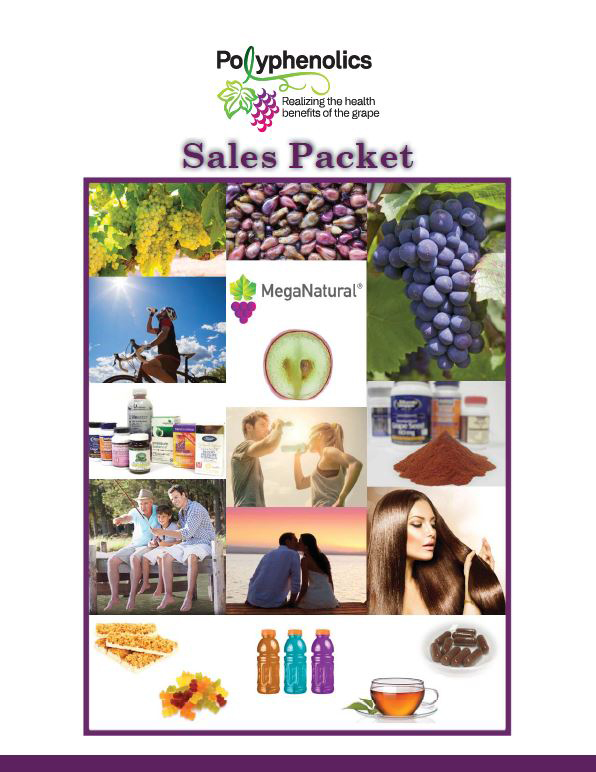Polyphenolics experts will be available at Engredea
2013 Booth 451 to discuss these exciting findings
Dietary modifications are usually one of the first recommendations made by healthcare providers when someone is diagnosed with pre-hypertension or metabolic syndrome. But while adopting a healthier diet may seem easy, many people find it difficult to change their old eating habits. Now two new studies indicate that adding a grape seed extract supplement, which is high in beneficial polyphenols, may help people at risk to improve their cardiovascular health.
In two newly published human clinical studies conducted by the University of California, Davis researchers have concluded that a patented grape seed extract may help lower blood pressure in individuals with pre-hypertension, and may reduce post-meal glycemic response as well as LDL concentrations in individuals diagnosed with metabolic syndrome. These studies build on an already solid body of scientific evidence of grape seed extract’s cardiovascular benefits.
Representatives from Polyphenolics, which supplied its MegaNatural products for both studies, will be on hand to discuss the findings during Engredea 2013 at Booth #451.
Reducing blood pressure among pre-hypertensive adults
Hypertension affects approximately 60 percent of Americans, and remains a major cause of death in the U.S. It is currently estimated that 31 percent of adults over age 18 are pre-hypertensive. It has been suggested that eating a diet rich in fruits and vegetables promotes lower blood pressure in part because of the phenolic compounds contained by plant products. Previous studies have shown that Polyphenolics’ MegaNatural-BP grape seed extract helps to reduce blood pressure by relaxing blood vessel walls.
In the results of a randomized double blind, placebo-controlled study, published in the Journal of Pharmacy and Nutrition Sciences, UC Davis researchers describe how grape seed extract significantly lowered systolic and diastolic blood pressure among 32 pre-hypertensive adults after just eight weeks. MegaNatural-BP was chosen for use in this study. “This study showed that the extract when administered orally at a dose of 300 mg daily resulted in a significant reduction in blood pressure,” commented lead researcher C. Tissa Kappagoda, professor, director Cardiac Rehabilitation Program, UC Davis.
While acknowledging that the study was small, the researchers commented that this is evidence that the polyphenolic compounds present in grape seed extract, “could form the non-pharmaceutical basis for managing hypertension.” They added that supplementation could be a means for stemming the short- and medium-term results of a poor diet.
Managing post-meal LDL cholesterol levels, and glycemic responses, among adults with metabolic syndrome
Metabolic syndrome is a growing health concern that is associated with impaired glucose tolerance and poor glycemic control. Eating meals high in readily available carbohydrates and fats causes an increase in blood glucose and lipid levels, as well as increases in markers for oxidative stress, inflammation and insulin resistance.
UC Davis researchers investigated whether grape seed extract, which is rich in mono-, oligo- and poly-metric polyphenols, would modify post-meal oxidative stress and inflammation among adults diagnosed with metabolic syndrome. The results of the randomized, crossover, placebo-controlled study were published in the journal: Functional Foods in Health and Disease. MegaNatural-Gold Grape Seed Extract was used in this human clinical study.
In the study, 12 individuals were randomized to receive either grape seed extract or a placebo approximately one hour before eating a high-fat, high-carb breakfast containing approximately 670 calories, 40 percent of which were from fat. This breakfast mimics the typical Westernized eating patterns which are associated with such chronic diseases as diabetes and cardiovascular disease. Participants who received the grape seed extract had improved antioxidant status and experienced reduced blood sugar spikes after their meal.
The researchers concluded that these findings support a growing body of research that suggests consuming polyphenol-rich foods and extracts with or within an hour of a meal can minimize some of the unfavorable effects of modern diets and lifestyle patterns.
Polyphenolics, a division of California Natural Color and E. & J. Gallo Winery, manufactures, markets and sells ingredients for nutraceutical, functional and medical foods. To learn more about this research, as well as other studies using Polyphenolics’ MegaNatural grape seed extract products, visit Polyphenolics at Booth #451 during the upcoming Engredea 2013 Exposition, March 8-10 at the Anaheim Convention Center. Or, visit www.Polyphenolics.com.



